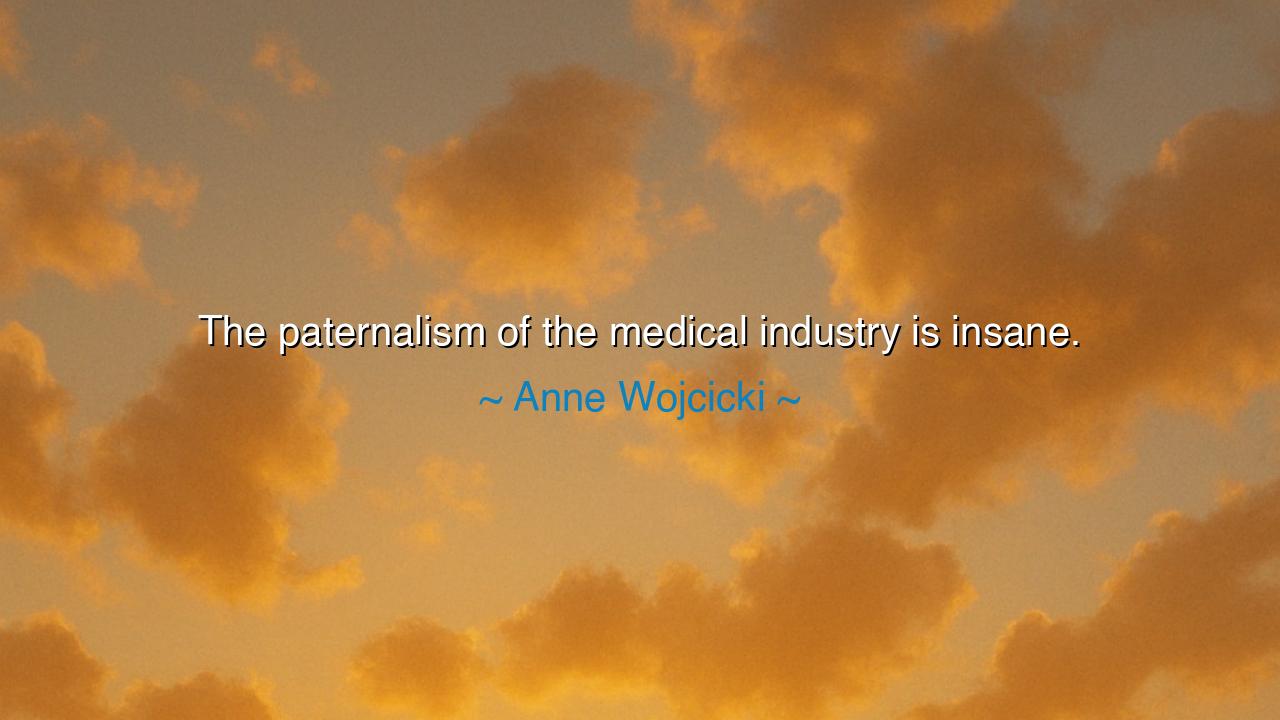
The paternalism of the medical industry is insane.






The words of Anne Wojcicki strike like a thunderclap upon the still air of complacency: “The paternalism of the medical industry is insane.” Though brief, this declaration carries the power of rebellion and revelation. It is the cry of one who has looked upon an ancient institution and found it cloaked in arrogance, bound by tradition, and forgetful of its purpose. Beneath her words lies a truth that echoes through the ages—that knowledge, when hoarded by the few and withheld from the many, ceases to be healing and becomes tyranny. Wojcicki, the founder of 23andMe, speaks not merely against doctors or hospitals, but against a system that treats patients as children and withholds from them the wisdom that rightfully belongs to them.
The term paternalism comes from the ancient root pater—“father.” It describes a relationship in which one, believing himself wiser, takes control of another “for their own good.” In the past, such care might have been born of love, but over time it has hardened into condescension. The medical industry, once a sanctuary of compassion, has in many places become a citadel of authority. It speaks in the voice of power, not partnership. It guards information behind the walls of bureaucracy and jargon, believing that ordinary people cannot understand the mysteries of their own bodies. Wojcicki’s protest is not against medicine itself, but against the arrogance that denies individuals the right to participate in their own healing.
In this, she stands in a lineage of those who have fought to return wisdom to the people. Think of Hippocrates, the ancient Greek physician who declared that “knowledge of the body belongs to all men.” In his time, medicine was shrouded in superstition and guarded by priests. He broke that secrecy, teaching that the understanding of illness and health was not divine mystery, but reasoned science. He freed medicine from the temples. Now, Wojcicki calls for a second liberation: to free medicine not from religion, but from paternalism, to place knowledge once again into the hands of those who live within the bodies it concerns. Her cry is for transparency, for empowerment, for partnership between healer and healed.
The insanity she speaks of lies in the contradiction between modern capability and ancient control. In an age when DNA can be read like scripture and the secrets of the cell are laid bare, it is madness to cling to old hierarchies of power. How strange, she observes, that a person may map the heavens from a smartphone but still must beg permission to understand their own genetic code. How absurd that the gatekeepers of medicine, sworn to heal, should fear the enlightenment of their patients. The paternalism of the system assumes fragility where there is strength, ignorance where there is curiosity, and submission where there should be dialogue.
History provides us with a mirror for this struggle. In the nineteenth century, when Ignaz Semmelweis discovered that washing hands between patients could prevent the spread of disease, his findings were dismissed by his peers. Why? Because he was seen as challenging the wisdom of the establishment. The physicians of his day—custodians of a rigid hierarchy—could not bear to admit that they were wrong. Thousands died as a result. This, too, is paternalism—the belief that authority matters more than truth. Wojcicki’s words expose that same flaw in the modern world: that progress is not hindered by lack of knowledge, but by pride.
Yet her message is not one of destruction, but of awakening. The healer and the patient must walk as equals, each bringing what the other cannot: the doctor, skill; the patient, self-knowledge. To reject paternalism is not to reject expertise—it is to restore balance. Just as a teacher must one day let the student think for themselves, so must the physician empower the patient to understand their body, their treatment, and their destiny. The future of medicine must be a dialogue, not a decree. The one who listens will heal more than the one who commands.
So, my child of reason, take this lesson deeply into your heart: never surrender your right to knowledge, especially of your own life and health. Seek understanding; ask questions; demand clarity from those who would serve you. Do not mistake humility for submission. The wise student honors the teacher, but never ceases to think for themselves. For wisdom is not meant to be guarded by the few—it is the inheritance of all.
In the end, Anne Wojcicki’s words are not a rebellion against doctors, but a call to enlightenment. The paternalism she condemns is not the care of a father, but the arrogance of one who forgets that healing is a partnership. The medical industry, if it is to regain its soul, must remember that the patient is not an object of treatment, but a participant in truth. Let the walls fall; let the knowledge flow. For when medicine ceases to command and begins to collaborate, it will at last return to its divine purpose—not to rule over life, but to honor it.






AAdministratorAdministrator
Welcome, honored guests. Please leave a comment, we will respond soon